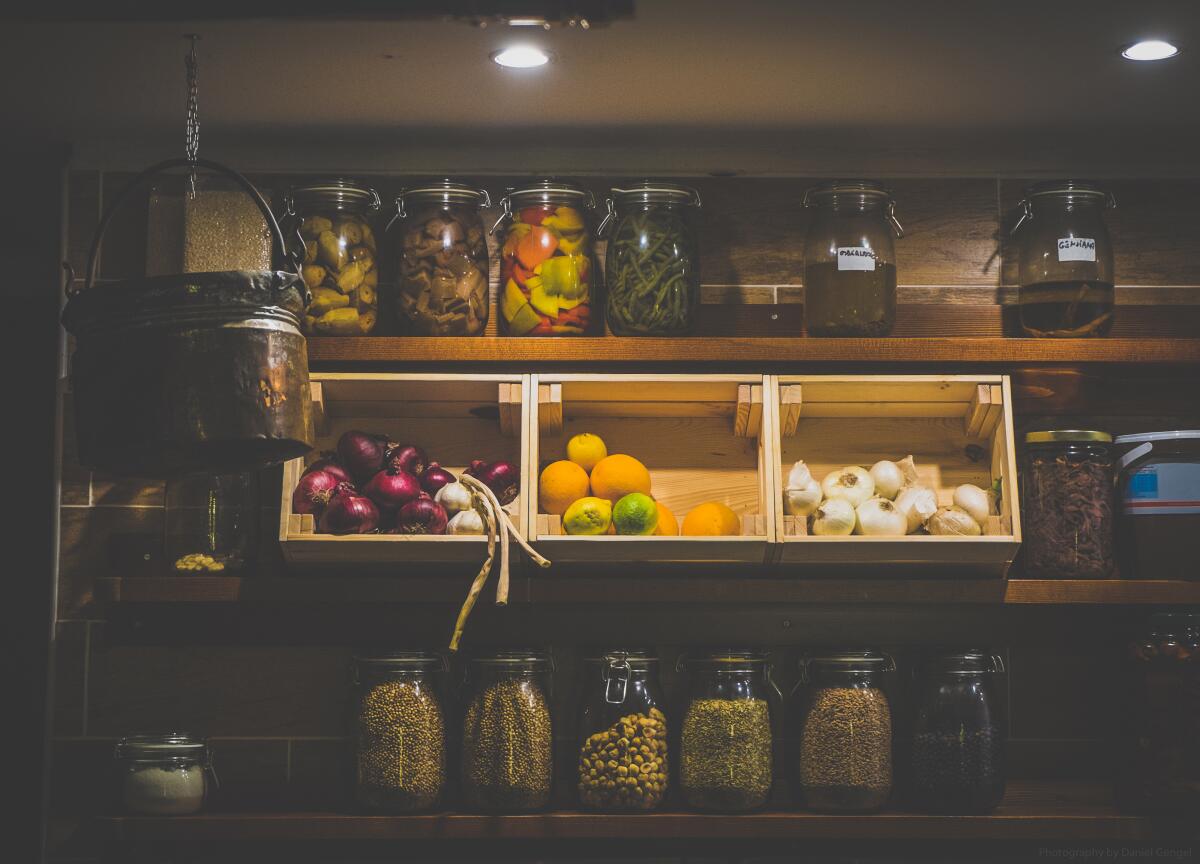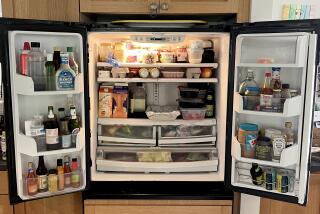Opinion: What’s with all the ‘pantry porn’ on Instagram and TikTok?

- Share via
Neatly aligned glass spice jars tagged with printed white labels. Wicker baskets filled with packages of pasta, crackers and snacks. Rows of flavored seltzer water stacked in double-decker plastic bins.
In today’s consumer culture, “a place for everything and everything in its place” isn’t just a mantra; it’s big business. As someone who studies digital consumer culture, I’ve noticed an uptick in glamorized, stylized and fully stocked pantries on TikTok and Instagram, giving rise to a content genre I dub “pantry porn.” These online shrines say a lot about our cultural moment — simultaneously raising awareness of the unpaid and long-unseen labor that makes households work and also creating new unrealistic expectations that perpetuate classist, racist and sexist divisions.
The pantry — derived from the Latin word for bread, “panis” — was originally a hidden space for storing food. It was purely functional, not a place to show off to others. As open floor plans became popular in the U.S. in the 1950s, kitchens emerged into plain view, setting the stage for sweeping floor-to-ceiling, wall-to-wall cabinetry. Now meticulously arranged pantries appeal to middle-class sensibilities: Maybe you can’t have a designer kitchen. But you can beautify your bulk food storage.
In the last decade, an entire cottage industry of blogs, books and television shows has introduced people to terms like “decluttering,” “minimalism” and “simple living.”
Minimalism once represented a countercultural lifestyle rooted in anti-consumption: use less, buy less, have less. But if pantry porn is any indication, the new minimalism means “more is more” as long as the “more” is not messy.
Storing spices in coordinated glass jars and color coordinating dozens of sprinkles containers may seem trivial. But tidiness is tangled up with status, and messiness is loaded with assumptions about personal responsibility and respectability. Cleanliness has historically been used as a cultural gatekeeping mechanism to reinforce status distinctions based on a vague understanding of “niceness”: nice people, with nice yards, in nice houses, make for nice neighborhoods.
What lies beneath the surface of this anti-messiness, pro-niceness stance is a history of classist, racist and sexist social structures. In my research, influencers who produce pantry porn are predominantly white women who demonstrate what it looks like to maintain a “nice” home by creating a new status symbol: the perfectly organized, fully stocked pantry.
Perhaps it’s not surprising that pantry porn found its foothold during the COVID-19 pandemic, when shortages in the supply chain surged. Keeping stuff on hand became a symbol of resilience for those with the money and space to do so. This allure of strategic stockpiling is evident in other collector subcultures like doomsday preppers and extreme couponers.
The work required to restock, refill and reset the kitchen is a central element in producing everyday pantry porn. This work often falls to women in the household. One TikTok mom goes on a “snack strike,” stating she will not restock the pantry until her children and husband eat what is already on hand.
Magazines like Good Housekeeping were once the brokers of idealized domestic work. Now online pantry porn sets the aspirational standard for becoming an ideal mom, ideal wife and ideal woman. This grew out of a shift toward an intensive mothering ideology that equates being a good mom with time-intensive, labor-intensive, financially expensive care work.
Sure, all of those baskets and bins serve a functional purpose in the home: seeing what you need, when you need it. But the social pressure to curate a perfect pantry might make some women work overtime. They can’t just shove store-bought boxes of snacks into a cupboard; they must neatly place the grab-and-go snacks into a fully stocked pantry that rivals a boutique corner store.
Pantry porn, as a status symbol, relies on the promise of making daily domestic work easier. But if women are largely responsible for the work required to maintain the perfectly organized pantry, it’s critical to ask: Easier for whom?
Jenna Drenten is an associate professor of marketing at Loyola University Chicago. This article was produced in partnership with the Conversation.
More to Read
A cure for the common opinion
Get thought-provoking perspectives with our weekly newsletter.
You may occasionally receive promotional content from the Los Angeles Times.










